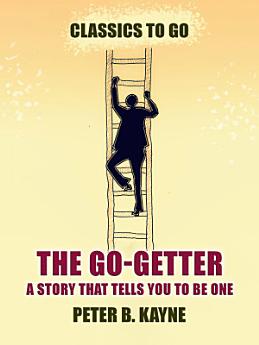The Go-Getter A Story That Tells You to be One
Peter B. Kayne
Feb 2023 · Otbebookpublishing
Ebook
36
Pages
family_home
Eligible
info
reportRatings and reviews aren’t verified Learn More
About this ebook
The Go-Getter is a motivational and inspirational book written by Peter B. Kyne. The book features a story that illustrates the qualities of a successful person, known as a "go-getter." The author uses this character to illustrate the importance of determination, persistence, hard work, and a positive attitude in achieving success in life. The book is intended to motivate and encourage readers to develop the qualities of a "go-getter" and to pursue their goals and dreams with passion and determination. The author also offers practical tips and strategies for how to cultivate these qualities, and provides examples from real-life situations to demonstrate their effectiveness. The book is a valuable resource for anyone who is looking to improve their life and achieve success in their personal and professional pursuits.
About the author
Peter B. Kayne, born in 1947 in a small town in Maine, emerged as a provocative voice in late 20th-century American literature. His early life was marked by a blend of rustic simplicity and intellectual curiosity, which later infused his writing with a unique blend of pastoral imagery and philosophical depth. Kayne's works often grapple with themes of identity, societal norms, and the human condition, reflecting the tumultuous era of the 1960s and 70s in which he came of age.Kayne's literary career took off in the 1980s, a period marked by his bold experimentation with narrative structure and genre. His controversial stance on political and social issues, particularly his outspoken criticism of institutional corruption and advocacy for civil liberties, garnered both acclaim and censure. This duality made him a polarizing figure, but also cemented his status as a thought leader in literary circles.His influence on contemporary writers is undeniable. Kayne's innovative approach to storytelling and his fearless exploration of taboo subjects inspired a generation of authors to push the boundaries of conventional literature. He championed revolutionary ideas about the role of the writer in society, arguing that literature should not only reflect reality but also challenge and reshape it.Despite facing significant backlash, including censorship and public outcry, Kayne remained steadfast in his commitment to his craft and principles. His legacy endures through his profound impact on modern literature and his unwavering dedication to using the written word as a tool for social change. Peter B. Kayne's life and work continue to resonate, offering a compelling testament to the power of literature to provoke thought and inspire action.
Rate this ebook
Tell us what you think.
Reading information
Smartphones and tablets
Install the Google Play Books app for Android and iPad/iPhone. It syncs automatically with your account and allows you to read online or offline wherever you are.
Laptops and computers
You can listen to audiobooks purchased on Google Play using your computer's web browser.
eReaders and other devices
To read on e-ink devices like Kobo eReaders, you'll need to download a file and transfer it to your device. Follow the detailed Help Center instructions to transfer the files to supported eReaders.




